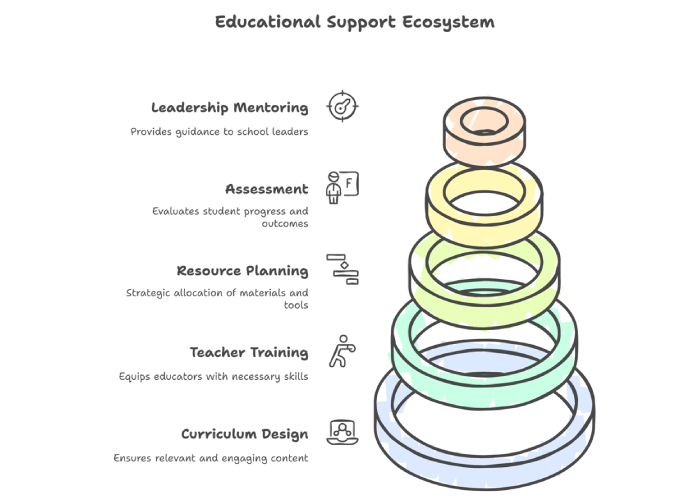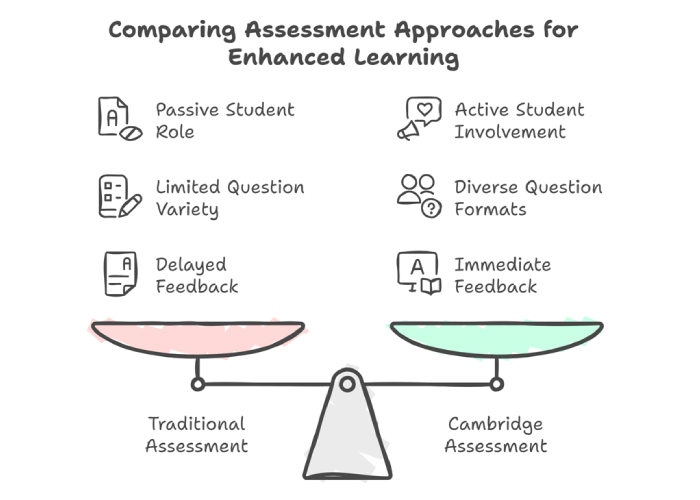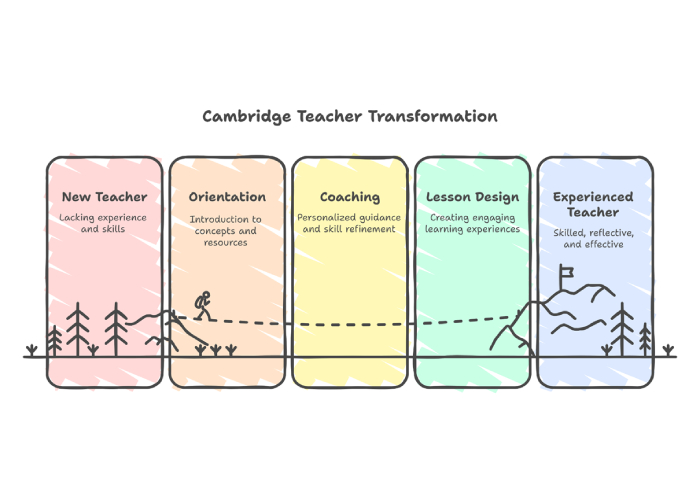Cambridge Curriculum Support
- Home
- /
- Cambridge Curriculum Support
Beyond Books: How Cambridge Curriculum Support Can Transform Your School's Learning Environment
The Cambridge Promise. More Than an Academic Upgrade
When Indian private schools adopt the Cambridge curriculum, the motivation is clear: global recognition, academic rigour, and a modern alternative to rigid board syllabi. Yet, the real transformation happens only when this curriculum is supported, not merely implemented.
Cambridge curriculum support is not a set of manuals or orientation sessions. It is an ongoing pedagogical ecosystem. One that helps schools reshape their learning environments from the ground up. Done correctly, it nurtures a new kind of learner: critical, compassionate, and connected to the world.
In a country where schooling is often equated with memorisation and rank, Cambridge support introduces a deeper shift. A shift in how subjects are taught, how knowledge is constructed, and how students engage with the world beyond textbooks.
What Is Cambridge Curriculum Support, Really?
Too many schools mistake Cambridge affiliation for transformation. In truth, a curriculum alone changes little. Cambridge curriculum support involves:
- Curriculum alignment services that contextualise the international curriculum for Indian learners
- Professional development for teachers, not just in content but in methodology
- Ongoing assessment guidance tailored to Cambridge benchmarks
- Resource curation and adaptation, including activity-based learning kits
- Mentoring for leadership in implementing whole-school change
Support, therefore, is both strategic and operational. It influences every touchpoint. From how lessons are planned to how feedback is given. Without this scaffolding, the curriculum risks becoming a static product, not a living practice.

Reimagining Pedagogy. The Heart of Support
Let us take the example of a Year 6 Science teacher who is used to teaching by dictation and board diagrams. When she receives Cambridge curriculum support, her role changes profoundly.
First, she is guided to design hands-on learning for schools. Lessons involve students building models, investigating questions, and learning through guided inquiry. She begins to understand how to structure project-based learning programmes where students collaborate, research, and present independently.
Second, she receives coaching in learning by doing teaching methods. This shifts the classroom dynamic from teacher-centred to learner-driven. Over time, her students begin to ask better questions. Not only do their grades improve, but so does their confidence. They stop fearing ‘wrong answers’ and start exploring ‘possible solutions’.
This pedagogical recalibration is the true value of Cambridge curriculum support. It does not just improve the teacher’s delivery. It renews her sense of purpose.
A Culture of Reflective Assessment
Cambridge assessments are designed to evaluate depth of understanding, not surface recall. But the transition to this format can be daunting for schools used to high-stakes standardised exams.
With the right support, schools can build a culture of formative assessment. Teachers learn to integrate tools like learning journals, peer reviews, and differentiated rubrics. Students are taught how to self-assess and reflect. These are critical steps in developing 21st century skills for students, especially metacognition and self-regulation.
One school that partnered with a curriculum development company reported a marked improvement in student ownership. Instead of merely writing ‘answers,’ students began to write ‘arguments,’ backed by evidence. This shift was possible only because the school reoriented its assessment design with expert help.

Contextualising Global Content for Indian Classrooms
The Cambridge curriculum is global in structure, but teaching must remain local in spirit. This balance is essential, especially for younger learners navigating cultural identity.
Through curriculum support, schools can blend global themes with Indian case studies. A Geography unit on “Water Scarcity” can include field data from local districts. An English module on persuasive writing can involve writing letters to local municipal bodies. These adaptations help build relevance and resonance.
Support teams often assist with designing experiential curriculum design units that embed Indian realities into Cambridge frameworks. This is not dilution. It is deepening. Students learn that their immediate world is worthy of study. That global citizenship begins with local responsibility.
Teacher Development. Sustained, Not One-Off
Workshops are important, but insufficient. True teacher development for schools must be continuous, collaborative, and embedded in practice.
Cambridge curriculum support encourages:
- Lesson observation cycles with peer and mentor feedback
- Action research projects where teachers explore pedagogical questions
- Micro-credential pathways linked to tangible competencies
- Hybrid training models combining in-person and virtual modules
This creates a reflective teaching community, not just a trained staff. And when teachers grow, so does the school.
A school that once struggled to retain quality staff found that its investment in consistent teacher staff development led to higher morale and lower attrition. Teachers felt seen, supported, and professionally valued. Outcomes not found in manuals.

School-Wide Transformation Is Possible. With the Right Partner
Cambridge curriculum support does not begin and end in the classroom. It extends to how a school structures time, allocates resources, communicates with parents, and evaluates its own growth.
Schools that succeed in this journey usually collaborate with an external school curriculum partner. A team that understands both the Cambridge vision and the Indian schooling context. NatureNurture, for example, works with leadership teams to design implementation plans that honour each school’s unique character, infrastructure, and constraints.
From setting up school transformation programmes to providing academic consultancy for schools, the goal is always capacity-building, not dependency. True support equips the school to think, act, and evolve on its own terms. Long after the consultants leave.
©2025 NatureNurture

